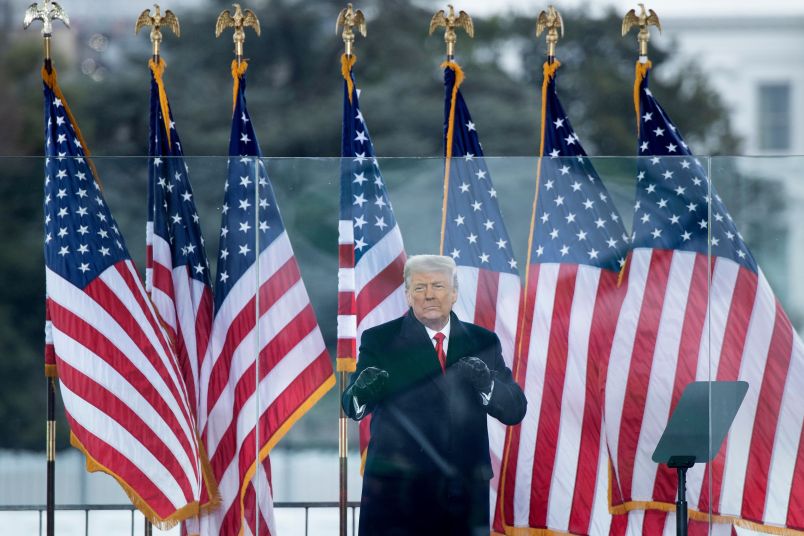Donald Trump is not immune from prosecution for his efforts to stay in power after losing the 2020 presidential election, the D.C. Circuit said in a Tuesday ruling.
The long-anticipated decision removes a key obstacle to returning the case to the district court, which has been frozen since Trump launched his appeal claiming that presidential immunity and the failure to convict him at a February 2021 impeachment trial preclude his prosecution.
Despite speculation given the court’s delay in issuing the ruling, all three judges on the D.C. Circuit panel joined the opinion. Some had wondered whether Judge Karen Henderson, the only judge on the panel appointed by a Republican president, was holding up the ruling by writing in dissent.
But the judges issued an opinion that was unanimous in finding that Trump has no special protections due to his status as a former president.
“For the purpose of this criminal case, former President Trump has become citizen Trump, with all of the defenses of any other criminal defendant,” the opinion said. “But any executive immunity that may have protected him while he served as President no longer protects him against this prosecution.”
The judges turned scathing in their recounting of the charges against Trump included in the indictment, calling them, if proven, “an unprecedented assault on the structure of our government.”
The unanimous decision emphasizes a key principle that Trump has sought to contest for the past several years: that nobody — not even the President — is above the law. The ruling doesn’t apply to Trump alone. It affirms a fundamental constitutional principle that holding executive power does not forever place you beyond the reach of criminal prosecution.
“We cannot accept former President Trump’s claim that a President has unbounded authority to commit crimes that would neutralize the most fundamental check on executive power — the recognition and implementation of election results,” they wrote. “Nor can we sanction his apparent contention that the Executive has carte blanche to violate the rights of individual citizens to vote and to have their votes count.”
The judges infused the ruling with historical data points, perhaps to appeal to the right-wing Supreme Court justices who all but demand that arguments interpret the Constitution through an originalist lens. The panel quoted the framers, including Alexander Hamilton, underscoring their efforts to differentiate the American presidency from the “sacred and inviolable” British monarchy.
Critically, the panel found that the charges against Trump from the indictment may permissibly be heard in federal court without running afoul of the separation of powers doctrine. Precedential cases, the judges wrote, underscore that “we may review the President’s actions when he is bound by law, including by federal criminal statutes.”
They took up and dismissed the pillars of Trump’s arguments in turn: The “interest in criminal accountability,” they wrote, outweighs concerns about chilling presidential conduct, or threatening him with frivolous litigation. Legislators and judges can be criminally prosecuted for official acts, despite enjoying other protections. Criminal prosecution after impeachment can’t be double jeopardy, they argued, as impeachment’s punishment is political and not criminal in nature.
Trump had leaned heavily on his acquittal at the February 2021 impeachment trial as a way to avoid prosecution, arguing that it somehow created a double jeopardy argument which would bar his prosecution. The D.C. Circuit dismissed that out of hand, but not without a flourish aimed squarely at an argument Trump’s attorneys had made during the impeachment trial: that “the appropriate vehicle for ‘investigation, prosecution, and punishment’ is ‘the article III courts,’ as ‘[w]e have a judicial process’ and ‘an investigative process . . . to which no former officeholder is immune.’”
The D.C. Circuit raised that argument partly as a way to knock down Trump’s claim that the prosecution would forever cause presidents to look over their shoulders before taking a controversial action: “The risk of criminal liability chilling Presidential action appears to be low.”
In a statement, Trump campaign spokesperson Steven Cheung said: “President Trump respectfully disagrees with the DC Circuit’s decision and will appeal it in order to safeguard the Presidency and the Constitution.”
A separate judgment issued by the appeals court panel puts Trump on a tight clock. The appeals court will hold onto the case through Feb. 12, giving Trump a chance to appeal to the Supreme Court. The D.C. Circuit structured the stay so it will automatically continue until the Supreme Court rules on Trump’s request that it take the case. If Trump doesn’t act by the end of Feb. 12, the case reverts back to the trial court. Notably, the appeals court did not give Trump a specific allotment of time to ask the full D.C. Circuit for a rehearing. That puts Trump in a box, and could spur him to appeal directly to the Supreme Court, potentially sealing off one avenue of appeal, which could add weeks or months of time.
One option to avoid the lengthy appeals process before trial came from watchdog group American Oversight, which filed an amicus brief suggesting that the appeals court lacked jurisdiction to hear the immunity issue until after the trial. Under that proposal, the D.C. Circuit would have sent the case back to the district court, causing the trial schedule to resume immediately.
But the three-judge appeals panel rejected that idea, saying that the president’s special status would make it “‘unseemly’ for us to require that former President Trump first be tried in order to secure review of his immunity claim after final judgment.”
The judges were decisive in their unanimity: Trump’s get-out-of-jail-free card, at least for now, won’t work.
“Former President Trump lacked any lawful discretionary authority to defy federal criminal law and he is answerable in court for his conduct,” they wrote.
Read the per curiam decision here:







That is one great big nail in Trump’s coffin. Many more to come.
Oh for the MGM lion roaring picture. Go. Get. Him.
The DC Circuit RULES!
It buys him another delay.